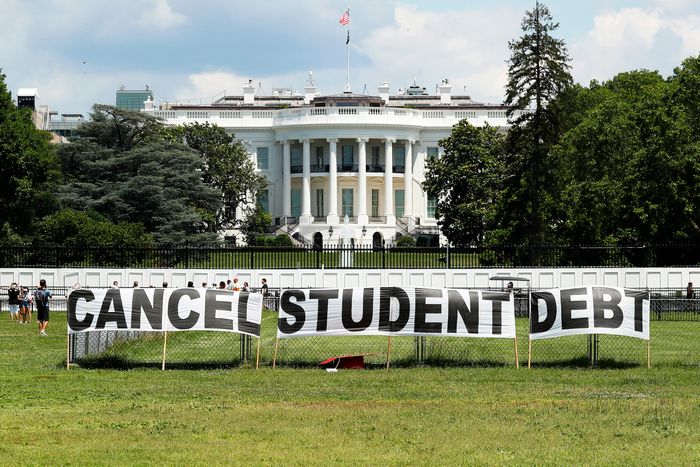
Americans with student loan debt get another temporary reprieve. The Biden White House announced on Wednesday that the president would extend a moratorium on loan repayment until May 1. The moratorium was originally scheduled to expire next month, so May 1 is a clear improvement on the status quo. Yet Wednesday’s extension raises uncomfortable questions for the administration.
Americans collectively owed $1.6 trillion in student debt as of 2020. On the campaign trail, Biden had pledged to forgive $10,000 in student loan debt. That’s far less than plans put forward by Senators Bernie Sanders and Elizabeth Warren during the Democratic primary and far less, again, than a bill sponsored by Warren and Senate Majority Leader Chuck Schumer, which would cancel $50,000 in student loan debt if enacted. Biden has been clear on one point: He doesn’t believe he has the executive authority to cancel so much debt, an argument that progressives strenuously contest. His initial campaign pledge endures, however, and now it haunts him.
By extending the moratorium until May 1, Biden merely delays questions he can’t evade forever. Will he carry out the modest debt relief he promised? Or will he demur, swayed by arguments against cancellation? According to some, student debt is an elite problem, and Biden has shown himself susceptible to that rhetoric. The government, he said last February, should not forgive the debt of those who went to “Harvard and Yale and Penn.” There are obvious cracks in the president’s commitment to student debt cancellation, pandemic notwithstanding, and that should concern debtors and their advocates.
Student loan debt is not a problem for elites. It principally troubles the very families Biden says he most wants to help. As the cost of college increases, financial burdens fall heaviest on middle-class and poor families whose chances of social mobility rest, often, on a college education. The debt crisis penalizes middle- and low-income students whether they attend a commuter school or Harvard. They pay for dreaming of anything better at all.
Experts agree that the problem contributes significantly to the racial wealth gap. “In 1989, college-educated white households had roughly five times greater wealth than their Black peers,” wrote Emory University law professor Dorothy Brown, the author of The Whiteness of Wealth: How The Tax System Impoverishes Black Americans — and How We Can Fix It. That wealth gap tripled by 2013, she added. “Student debt represents roughly 10 percent of the racial wealth gap when a college graduate is 25 years old, according to professors Fenaba R. Addo and Jason Houle. By age 30-35, it explains about 25 percent of the gap.” A report by the Roosevelt Institute found that if Biden instituted the $50,000 forgiveness plan championed by progressives, Black wealth would immediately increase by 40 percent.
People who default on their student loan debt also tend to come from poor backgrounds. “The vast majority of defaulters are older, more likely to be financially independent than other borrowers, and more likely to come from low-income families,” Andrew Harman wrote for the Georgetown Journal on Poverty Law and Policy. “In fact, roughly 90% of defaulters have received a Pell Grant, and 40% fall in the bottom quartile of the income distribution.” Biden’s original plan to forgive $10,000 of student loan debt would certainly help this population: “Further, rather than borrowing excessively to finance degrees, the median defaulter owes just under $10,000,” Harman added.
While the president bides his time, debtors inhabit a peculiar American purgatory. The moratorium is a buffer between pain and the debtor, but it’s not salvation, either. Biden holds that possibility in his hands. Public pressure preserved the moratorium for now and perhaps will do so again. Even if the pandemic has eased by May 1, debtors have one other bit of leverage: If repayment goes into effect ahead of midterm elections, the administration will be guilty of a catastrophic political error. Whether Biden realizes this or not is unclear.
It is clear, though, that debtors deserve more from the president. Biden’s current approach to student loan debt is simply unsustainable over the near term. He should listen to Sanders, Warren, and Schumer, but even if he won’t, the bit of relief he once promised is preferable to confusion and delays. Quit dithering and cancel the debt.






























